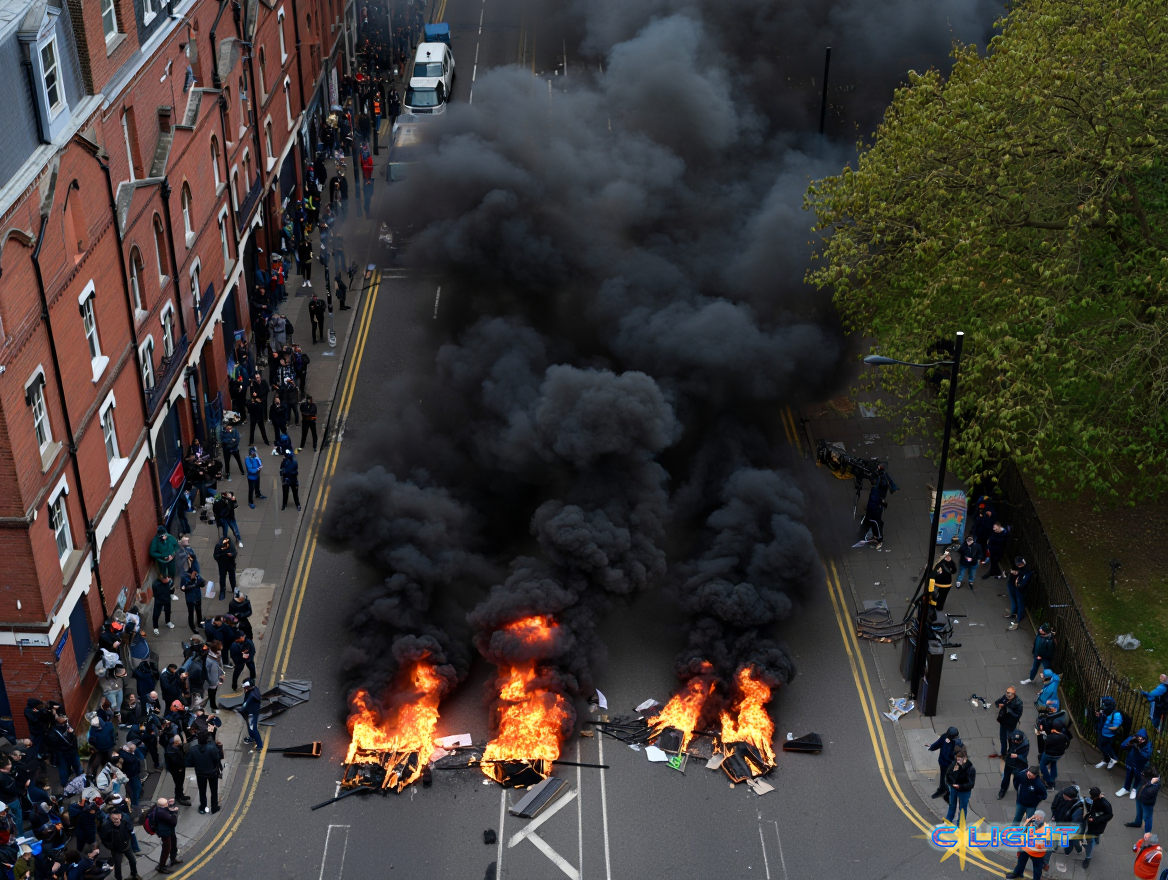“Listen, children, to a story That was written long ago About a kingdom on a mountain And the valley folk below…” — The Original Caste, “One Tin Soldier”
There is an old story, a sad parable about a people in a valley who, consumed by suspicion, convinced themselves that a great treasure was hidden on the mountain above. They sent messengers demanding the treasure, but the mountain people offered to share everything they had in peace. The valley people, in their anger, rejected the offer, drew their swords, and slaughtered the people of the mountain. And when they stood victorious beside the stone that supposedly marked their prize, they turned it over to find only three words written beneath: “Peace on Earth.”
This weekend in Los Angeles, that old story was retold, not with swords and horses, but with armored trucks and tear gas. The valley folk—the administration of Felonious Punk—convinced that a treasure of criminality and disorder was hidden in the city, sent their tin soldiers to claim it. And the mountain people—the immigrant communities of Los Angeles and their allies—found themselves under siege.
Act I: The Message Up the Hill
The first message from the valley was a brutal one. It arrived on Friday as a multi-agency blitzkrieg, a show of force involving ICE, HSI, the FBI, and the ATF, all reportedly acting under the direction of Attorney General Pam Bondi’s Justice Department. The week’s tally of arrests in L.A. would climb past 100, part of a national push to meet a reported internal quota, handed down from White House architect Stephen Miller, of 3,000 arrests per day.
Inside the Ambiance Apparel warehouse, worker Omar Diaz described how agents corralled dozens of employees, lining them up against a wall for interrogation. Outside, women wept for their husbands and fathers. The message was clear: there is no safe harbor. This was the valley’s demand for the treasure. The day’s chaos found its focal point in the injury and arrest of David Huerta, the powerful president of the SEIU in California, an act that would later ignite a national labor movement in response.
Act II: The Answer from the Kingdom
The city’s response, its answer from the mountain, was not one of submission, but of community and a plea for peace. The city’s entire political establishment—from the Governor to the Mayor to all 15 members of the City Council—issued a unified chorus of condemnation, calling the raids “cruel” and tactics that “sow terror.”
The arrested union president, David Huerta, issued a statement from custody that was not a call to arms, but a call to conscience: “We all collectively have to object to this madness because this is not justice. This is injustice.” This was the offer from the mountain: “With our brothers, we will share… all the riches buried there”—the riches of community, hard work, and justice.

Act III: The Valley Cried with Anger
The valley, however, was not interested in peace. It cried with anger. The administration branded the protests a “form of rebellion” and a “violent insurrection.” Vice President JD Fuxacouch declared that “Insurrectionists carrying foreign flags are attacking immigration enforcement officers.”
And then came the final, violent escalation. Felonious Punk signed a directive authorizing 2,000 troops, invoking a legal provision for a “rebellion or danger of a rebellion.” He had federalized the California National Guard against the explicit will of Governor Gavin Newsom—an act not seen since 1965, when President Johnson deployed troops to protect civil rights marchers.
Governor Newsom blasted the move as a “serious breach of state sovereignty” and an attempt to “manufacture a crisis.” He dared the administration’s “border czar” to follow through on threats to arrest him, declaring, “Come after me, arrest me… I don’t give a damn, but I care about my community.” The White House responded with a sneer, with one spokesperson calling the governor’s concerns a “bald-faced lie” and Stephen Miller stating that the mayor of Los Angeles has “no say in this at all.” The swords were drawn.
“Go ahead and hate your neighbour. Go ahead and cheat a friend. Do it in the name of heaven, you can justify it in the end…”
The administration’s justifications poured forth. They were hunting “dangerous criminals.” Their agents were under “violent attack.” They were stopping “RIOTS & LOOTERS.” They were doing it all in the name of law and order, in the name of a safer America. As the protests escalated, with self-driving cars set ablaze and a major freeway shut down, the administration threatened to send in U.S. Marines and spoke openly of suspending the writ of habeas corpus.

The Bloody Morning After
As the sun rises on a new week, some 300 of the valley’s tin soldiers are on the ground in Los Angeles. They have made their arrests, cleared the freeways, and asserted the “supreme” authority of federal law. They have won their “just reward.”
But what is the treasure they have secured? What lies beneath the stone?
The answer has been there all along, in the words of the community leaders, the local politicians, and the workers themselves. The “treasure” is not a criminal conspiracy. It is a city of working families, of people who clean hotel rooms and manufacture clothes, of communities revitalized by the children of immigrants. The great, hidden secret on the mountain was that there was no monster to be slain.
When the administration finally turns over the stone, after all the chaos, all the terror, and all the violence, they will find the same message that the valley folk in the parable found, written in the heart of the city they have just brutalized: “Peace on Earth.”
“There won’t be any trumpets blowing, Come the judgement day On the bloody morning after One tin soldier rides away.”
Discover more from Clight Morning Analysis
Subscribe to get the latest posts sent to your email.










